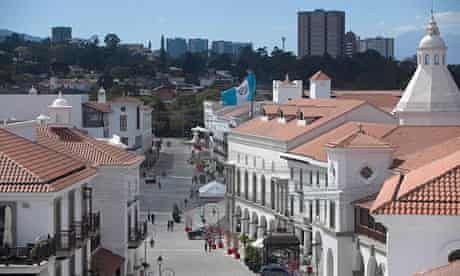Guatemalan capital's wealthy offered haven in gated city

Guatemalan developers are building a nearly independent city for the wealthy on the outskirts of a capital marred by crime and snarled by traffic. At its heart is the 34-acre (14-hectare) Paseo Cayala, with apartments, parks, high-end boutiques, church, nightclubs, and restaurants, all within a ring of white stucco walls.
The builders of Paseo Cayala say it is a livable, walkable development that offers housing for Guatemalans on a variety of incomes, though so far the cheapest apartments cost about 70 times the average Guatemalan's yearly wage. It's bordered by even costlier subdivisions begun earlier. Eventually, the Cayala Management Group hopes to expand the project into Cayala City, spreading across 870 acres 352 hectares (870 acres), an area larger than New York's Central Park .
Cayala's backers promote it as a safe haven in a troubled country, one with an unusual degree of autonomy from the chaotic capital. Detractors, however, say it is a blow to hopes of saving the traditional heart of Guatemala City by drawing the well-off back into the urban centre to participate in the economic and social life of a city struggling with poverty and high levels of crime and violence.
Architect Carlos Mendízabal said the private sector segregates the country's wealthiest from the urban poor.
"Cayala creates a world for those who can afford it. Cayala sells an illusion that everything is OK, but it is not open to all people," he said.
Many, however, are quite happy with that world.
"In my opinion, Cayala gives a new opportunity for Guatemalans to live without the fear of violence," said Diego Algara, who moved to an apartment in Paseo Cayala late last year. Algara, director-general of a firm that owns two restaurants and one of the most popular nightclubs in Guatemala, said the majority of his neighbours are young professionals and newlyweds looking for safety.
Cars access the Paseo through a single gate and immediately enter an underground garage. Residents and visitors emerge on foot through gazebo-covered escalators decorated like art-nouveau Parisian Metro stations.
Private security guards wearing suits and small earpieces with clear cords stand hidden behind columns and ride Segway powered scooters around the development. Unlike most upscale malls and other shops in the capital, where private guards openly tote rifles, Cayala Promenade's security guards carry concealed pistols.
At the centre of the development is the city hall with fluted columns where the owners' association meets. As a part of the capital, Cayala City is governed by the same mayor and municipal authorities. However, as in other private properties in Guatemala, the country's laws only allow the police to enter the premises with a warrant. If responding to a complaint, officers must wait at the gate and be authorised entry.
In most of Guatemala City, frantic car horns and "banda" music blast from street corners and buses. In Paseo Cayala, visitors sip on hot chocolate and lattes while perusing storefronts. English-language jingles play on loudspeakers throughout the town centre.
Maritza Alfaro, a 39-year-old teacher, said she was astonished during her first visit.
"You just can't help but pull over when you see just how big and white it is. It just doesn't feel like you're in Guatemala," she said. "I think more places like this should be built. I mean, look at how pretty it is."
Cayala's developers purchased the land in the 1980s and began building several conventional if costly subdivisions. But in recent years they have started to turn it into a virtual city. Work on the centrepiece, Paseo Cayala, began in January 2011 and developers say they have invested $66m (£41m) there to date. Plans include a neo-classical church that seats about 700.
According to the developer, the first phase of the Paseo project has 110 apartments, with sales prices ranging from $260,000 to $800,000 – way beyond the reach of most Guatemalans, whose average monthly salary is less than $300. The first of the two buildings has nonetheless sold 80% of its units, the developer said.
At the related residential developments alongside Paseo Cayala, typical homes go for $1m-$1.2m, according to Inmaculada Palomares, an independent real estate agency that caters to Guatemala's business elites.
Some urbanists and architects are sceptical the project can thrive over the long term in a country with one of the world's highest homicide rates and with roughly half of its 14 million people living in poverty.
"We can't fool ourselves into believing that a rigid, controlled and elitist project is public space and giving something to the city when it clearly isn't the case," said Alejandro Biguria, an architect who has worked on the largely successful rehabilitation of Guatemala City's historic downtown. "A city must have socioeconomic and cultural diversity."
Hector Leal, engineer and general manager of the Cayala City project, disagreed. He credited the project's success to the fact that it is a private sector initiative that did not have to go through endless bureaucratic hurdles.
"It is the idea of a public space created by the private sector," Leal said. "We have more control. That gives us the ability to offer security and to generate the kind of city people want to live in."




